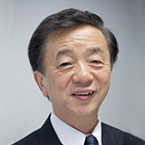
Scientific Areas of Expertise: Immune System Signaling and Transcription; Inflammatory Diseases; Tumor Immunology
For isolating and characterizing genes involved in mediating immune responses, including interferon-beta and interleukin-2, and for his discovery of the interferon regulatory family of transcription factors, which has resulted in improved understanding of the interplay between innate and adaptive immune responses, as well as the molecular mechanisms by which gene expression changes and signal transduction impacts immune system function, cancer initiation, and progression.
An internationally heralded immunologist, Dr. Taniguchi is revered for isolating and characterizing two cytokines involved in mediating immune responses, the human fibroblast interferon-beta (IFN-β) and interleukin-2 (IL-2), and for discovering the interferon regulatory family of transcription factors. Further, he is credited with discovering and characterizing the human IFN-β gene, the first interferon and cytokine gene to be identified, and subsequently elucidating the primary structure of type I interferon proteins, thus demonstrating that IFN-α and IFN-β constitute a gene family. After discovering the human IL-2 gene, Dr. Taniguchi isolated the IL-2 receptor β chain gene, showing for the first time that the IL-β chain transmits signals by recruiting non-receptor tyrosine kinases that contribute to the regulation of T cell responses. Most importantly, his generation of recombinant IL-2 enabled the study of lymphocyte proliferation, which directly led to the finding that IL-2 can promote B cell and natural killer cell growth, in addition to T cells. Recombinant IFN and IL-2 are now widely used for a variety of clinical applications including cancer, hepatitis, and multiple sclerosis.
Importantly, Dr. Taniguchi research also led to the identification of a novel family of transcription factors known as interferon regulatory factors (IRFs) and provided profound insights into the broad functions of IRF-1 and IRF-2 in the regulation of interferon responses and other immune functions. Furthermore, he revealed the role of IRF-3 and IRF-7 in the general regulatory mechanisms of IFN-α/β gene induction. Dr. Taniguchi’s groundbreaking discoveries have significantly improved our understanding of the interplay between innate and adaptive immune responses and of the underlying molecular mechanisms by which gene expression changes and signal transduction impact immune system function, cancer initiation, and progression. His seminal discoveries are now being globally translated into innovative drug design and development efforts to combat both cancer and various immunologic diseases.
Selected Awards and Honors
2018 Elected Associate Member, European Molecular Biology Organization
2016 Elected International Member, National Academy of Medicine, Washington, DC
2012 Professor Emeritus, University of Tokyo, Tokyo, Japan
2009 Person of Cultural Merit, Government of Japan, Tokyo, Japan
2008 Tomizo Yoshida Award, Japanese Cancer Association, Tokyo, Japan
2007 Honorary Doctorate, University of Zurich, Zurich, Switzerland
2006 Pezcoller-AACR International Award for Cancer Research, American Association for Cancer Research, Philadelphia, Pennsylvania
2006 Laurea Honoris Causa, University of Verona, Verona, Italy
2003 Foreign Associate Member, National Academy of Sciences, Washington, DC
2000 Japan Academy Prize, Japan Academy, Tokyo, Japan
1997 Keio Medical Science Prize, Keio University, Tokyo, Japan
1996 Princess Takamatsu Cancer Research Prize, Princess Takamatsu Cancer Research Fund, Tokyo, Japan
1991 Robert Koch Prize, for Excellence in Scientific Achievement, Robert Koch Foundation, Berlin, Germany
1989 Asahi Prize, Asahi Shimbun Foundation, Osaka, Japan
1988 Milstein Award, International Cytokine & Interferon Society, Geneva, Switzerland